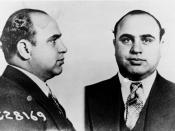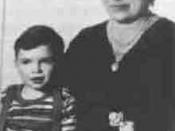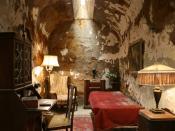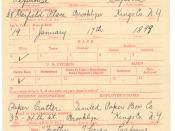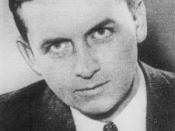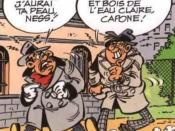Eliot Ness April 19th, 1903, Elliot Ness, was born. Peter and Emma Ness a middle class Norwegian family were living in Chicago. Eliot was the youngest of five children. Mr. Ness had Eliot help him out with his wholesale bakery business when he was younger. Later on Eliot became interested in law when his brother-in-law, Alexander, who was an agent for the Justice Department taught him how to shoot a gun. Eliot then attended the University of Chicago where he got his degree in business and law. Upon graduation he choose to become a retail credit investigator while at night he went back to the university to take classes on criminology. By 1927, after a year of night school, Ness got a job with the treasury department in Chicago. Shortly after Ness got his huge break.
U.S. District Attorney, George E. Johnson, had the job of closing down Capone's bootlegging operations and prosecuting him for thousands of Volstead infractions.
Finding honest men amongst the corruption Prohibition Bureau was no easy task for Mr. Johnson. Ness was one of the very few agents who had earned a reputation for reliability and honesty. Through the recommendations of his brother-in-law, who was an elite law enforcement officer, Eliot was tasked with assembling and leading the team to go after Capone's breweries and hard liquor operations. During this time Ness found nine other honest men to help him fight crime and not accept bribery. Ness and his nine man team of dedicated unbribable agents where named the "untouchables"ÃÂ.
With all his men assembled it was raid time. Ness was still only a rookie to raids but had a good idea what he needed to happen. On his first raid he went to the front door of the breweries and had to shoot out the lock on a wooden door then break through a steel door. When they got inside it was a huge room, reeking of beer, with two trucks half loaded with barrels. The only problem is that there wasn't a person in the place. Everybody had fled through an escape route on the roof. Ness was upset that they took no prisoners. Although, he was pleased that they had confiscated nineteen 1,500 gallon vats, 140 barrels of beer and two trucks, this is a total estimated value of $75,000 and a potential of 100 barrels a day.
Ness decided that he would need a new type of weapon if he wanted to force his way quickly into any other Capone's breweries. He got his hands on a 10 ton flatbed truck with a reinforced steel bumper covering the whole front. The flatbed also had scaling ladders so that his men could get on the roofs of the breweries. With his new equipment and a new plan he raided again at five in the morning when the trucks were normally loaded. One of the agents drove the truck through the closed doors of the brewery. With men stationed on the roof and at all doors. At this raid Ness had captured Capone's brewers and they where locked up.
Over the next months Ness and his team closed down brewery after brewery each time confiscating expensive equipment, barrels, vats, and trucks of all kinds. In the first six months of their operation they had closed down nineteen distilleries and key breweries worth an estimated $1,000,000. However, Capone fully believed that every man had his price so his next move was to have one of his men offer Ness $2,000 a week. With this in mind Ness wanted to use this event to make a point publicly. He gathered all of the news media for a press conference on Capone's failed bribery attempts. Ness explained his rationale: "Possibly it wasn't too important for the world to know that we couldn't be bought, but I did want Al Capone and every gangster in the city to realize that there were still a few law enforcement agents who couldn't be swerved from their duty". The story was carried by newspapers all over the country, one of which named the team "The Untouchables"ÃÂ.
By this time Ness had all mob phones taped and heard of all bootlegging operations. Consequently, Capone's men began to follow Ness and the other "Untouchables" around the clock. They installed a hotline for anyone who could inform them on what Ness and his agents were doing. If the tip was a good one the person received $500. Ness wasted no time in taping this phone as well. Ness also found out that the mobsters had taped his phones and those of his agents. The gangsters were able to do this by luring telephone company technicians with huge salaries to set up their own wiretaps.
Then Ness pulled one of the most risky moves in crime fighting to this day he called Capone and ordered to talk directly with him. Well, Snorkey,"ÃÂ Ness called him by the nickname only Capone's close friends used,"ÃÂ I just wanted to tell you that if you look out your front windows down onto Michigan Avenue at exactly eleven o'clock you'll see something that should interest you.
"What's up?"ÃÂ Capone asked.
"Just take a look and you'll see,"ÃÂ Ness said just before he slammed down the phone.
Ness then ordered all of Capone's seized trucks to be gathered and buffed. At eleven o'clock in the morning, the trucks came to Capone's Hotel headquarters. Moving very slowly they passed a bunch of Capone's gangsters outside the hotel. Ness could see the fury in Capone as he watched him on his balcony. This was a big day for Ness and his team. "What we had done this day,"àhe told people later, "was enrage the bloodiest mob in criminal history"æWe had hurled the defiance of "The Untouchables"àinto their teeth; they surely knew by now that we were prepared to fight to the finish."àNess and his group of untouchables secured evidence the helped send Capone to jail for income tax evasion. During these years in Chicago, Ness was in the spotlight but after Capone went to jail he almost vanished from the public. He didn't stop fighting crime. He still went on fighting the mob and putting a stop to bootlegging, illegal gambling, organized crime, corrupt cops and on a mission to find the countries most vicious serial killer "the mad butcher of Kingsbury Run"ÃÂ. Later Ness was in charge of the alcohol-tax unit of the U.S department of Treasury. Then he left Chicago and went to Cleveland where he was the director of public safety. In 1941 when World War II broke out he was the director of the Division of Social Protection of the Federal Security Agency in Washington D.C. After the war he went into his own private business. Shortly after Elliot Ness after died of a heart attack. He will always be remembered as getting Capone to jail. Elliot Ness was a hard worker who was paid 3,000 dollars a year.
